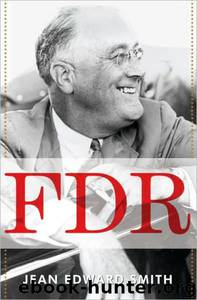FDR by Jean Edward Smith

Author:Jean Edward Smith
Language: eng
Format: mobi, epub, pdf, azw3
Tags: Politics, History, Biography, Non-fiction
ISBN: 9781588366245
Publisher: Random House
Published: 2007-05-15T00:00:00+00:00
NINETEEN
ON THE BRINK
What America does or fails to do in the next few years has a far greater bearing and influence on the history of the whole human race for centuries to come than most of us who are here today can ever conceive.
—FRANKLIN D. ROOSEVELT, DECEMBER 5, 1938
REPUBLICAN VICTORIES IN 1938 did not represent a return to Hooverism or a repudiation of the achievements of the New Deal. As the country had changed, so had the GOP. New leaders like Thomas Dewey in New York, Harold Stassen in Minnesota, even Robert Taft in Ohio did not advocate turning the clock back. It was time to digest and assimilate: a period of thermidor after six years of upheaval. “We have now passed the period of internal conflict in the launching of our program of social reform,” Roosevelt told Congress in his annual message on January 4, 1939. “Our full energies may now be released to invigorate the process of recovery in order to preserve our reforms.”1
FDR had sought to refashion the Democratic party into a permanent progressive force. But the resistance proved overwhelming. Southern Democracy remained the ball and chain that hobbled the party’s move to the left.2 The purge failed. And in the curious way of American politics, it would be those same disaffected Southern Democrats who would provide the president bedrock support to resist aggression and prepare the nation for war.
Until 1939 Roosevelt’s involvement in foreign affairs had been sporadic. In 1936, when Germany reoccupied the Rhineland, the president was running for reelection. When Japan invaded China in 1937, FDR was consumed by the Court-packing fight. When Hitler annexed Austria in March 1938, it was the “Roosevelt recession” on the front burner. The Czech crisis in September played out against the backdrop of the purge. And during the Spanish Civil War—which commenced in 1936 and would ultimately cost the lives of 650,000 combatants—the United States stood on the sidelines.3
Roosevelt’s approach to foreign policy was similar to his conduct of domestic affairs: intuitive, idiosyncratic, and highly personalized. Just as he divided the New Deal’s relief effort between Ickes and Hopkins, he split diplomacy between Cordell Hull and Sumner Welles. As secretary of state, Hull had titular responsibility. As undersecretary, Welles exercised operational control. Like Ickes and Hopkins, they competed for FDR’s attention. Unlike Ickes and Hopkins, they shared an abiding dislike. In the War Department Roosevelt presided over a similar rivalry. Secretary Harry Woodring and Assistant Secretary Louis Johnson detested each other. Woodring, a low-wattage Kansas banker, was cautious, provincial, and strongly isolationist. Johnson, a former commander of the American Legion, was a glad-handing ball of fire, vigorously internationalist in outlook. The Navy did not require a division of authority because FDR, to the extent he wished, ran it directly through the chief of naval operations, Admiral William D. Leahy. In each case—State, War, and Navy—Roosevelt kept the reins in his own hands. The method was not what textbooks teach, but neither Hull nor Welles, nor Woodring or Johnson, for that matter, could presume to act without clearance from FDR.
Download
FDR by Jean Edward Smith.epub
FDR by Jean Edward Smith.pdf
FDR by Jean Edward Smith.azw3
This site does not store any files on its server. We only index and link to content provided by other sites. Please contact the content providers to delete copyright contents if any and email us, we'll remove relevant links or contents immediately.
| American Revolution | Civil War |
| US Presidents |
Fanny Burney by Claire Harman(25796)
Empire of the Sikhs by Patwant Singh(22189)
Out of India by Michael Foss(16317)
Leonardo da Vinci by Walter Isaacson(11927)
Small Great Things by Jodi Picoult(6113)
The Six Wives Of Henry VIII (WOMEN IN HISTORY) by Fraser Antonia(4801)
The Wind in My Hair by Masih Alinejad(4431)
The Lonely City by Olivia Laing(4134)
The Crown by Robert Lacey(4121)
A Higher Loyalty: Truth, Lies, and Leadership by James Comey(4045)
The Iron Duke by The Iron Duke(3657)
Millionaire: The Philanderer, Gambler, and Duelist Who Invented Modern Finance by Janet Gleeson(3577)
Sticky Fingers by Joe Hagan(3461)
Alive: The Story of the Andes Survivors by Piers Paul Read(3325)
Papillon (English) by Henri Charrière(3283)
Joan of Arc by Mary Gordon(3272)
Stalin by Stephen Kotkin(3096)
Aleister Crowley: The Biography by Tobias Churton(3032)
Ants Among Elephants by Sujatha Gidla(2932)
